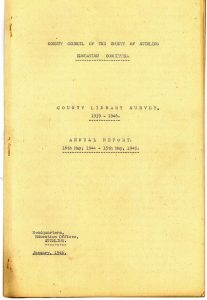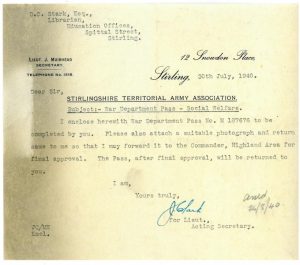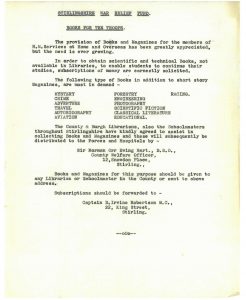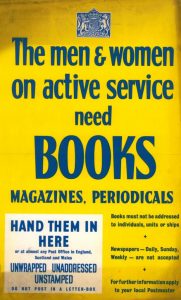Our document of the month for August focuses on the Stirling County Council Library Service during World War Two. Two records highlight the successes and hardships they encountered during the war:
- SCC/14/14/1/13 – Stirling County Council Library Survey, 1939-1945
- SCC/14/14/3/1 – Papers concerning the collection of books for war relief, 1939-1940
The first year of the war brought considerable dislocation to the library service. The service at this point was run almost entirely by voluntary labour and it inevitably suffered when these volunteers had more urgent demands to attend to. This included helping with evacuations, black-outs, emergency relief and air raids.
A greater problem, however, was the loss of books. This was primarily caused by the paper salvage scheme launched by the government in 1939. This was a compulsory scheme where households were required to recycle their paper to aid the war effort or face heavy fines.
The annual report of the library service, however, notes that people took the government’s appeal too literally. Thousands of borrowed books were destroyed as part of scheme. Moreover, people who were called up for active service did not return their borrowed books. It would have been the last thing on their mind! A counter campaign was launched by the British Records Association to safeguard archives and books of historical significance with the slogan ‘look before you throw’.
Despite these problems, the Stirling County Library Service played an invaluable roll during the war. In 1939, it was decided that a library service would be provided to hospitals, emergency units and military units within the Stirling County boundaries.
The following hospitals were supplied with a new library service: Drymen Military, Killearn Emergency, Larbert Base Emergency, Larbert Bellsdyke Military, Lennox Castle Emergency and Touch Convalescent.
The library service also worked closely with the British Red Cross, Stirlingshire War Relief Fund and the Stirlingshire Territorial Army Association. This close cooperation was also present between the military authorities and librarians. Stirling County librarians were given special passes to enter every military department in the County, secret or otherwise.
A ‘books for troops’ campaign was also launched in Stirling County with the libraries playing a vital role. The annual report notes that the first book supply was given to an ammunition train ‘somewhere in the County’ and that the County Librarian was pleased to provide recreational reading to the Royal Marines who were resting in the area at the time.



